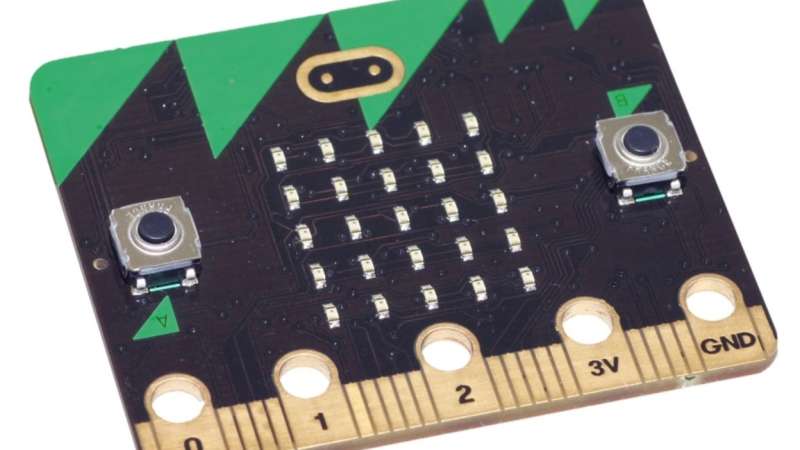October 20, 2016 weblog
Greater global outreach eyed for Micro:bit minicomputer

(Tech Xplore)—Kid coders is an idea everyone likes. The vision is that of a new army of survivors who can carry the ball forward in thinking up tomorrow's hardware and software, to make life interesting for themselves and make lives easier if not better for others.
The news on Wednesday is that kid coders around the globe will be able to enjoy the Micro:bit from a project formerly led by the BBC, where about 1 million of the devices previously were given away free to UK-based schoolchildren, said Leo Kelion, technology desk editor, BBC. The Micro:bits were also distributed to schools in the Netherlands and Iceland.
(Hot Hardware said that BBC had actually gifted 1 million of the DIY PCs to year 7 (sixth grade) students in the U.K. last year.)
This is a minicomputer. Think stripped -down bareboned tiny machine like Raspberry Pi. Kelion noted that "the Micro Bit is designed for users with little or no coding knowledge when they begin."
Now the machines are to be given a wider rollout, thanks to the foundation presently running the effort. Kelion quoted chief executive Zach Shelby. "Our goal is to go out and reach 100 million people with Micro Bit," he stated.
The BBC made it commercially available for anyone to purchase for around $19, said Hot Hardware, and now this new foundation has stepped in to spearhead the effort.
The BBC's Kelion said, "Although the BBC is relinquishing control of the project, it will retain a seat on the foundation's board and the hardware will still be branded with its name."
On the foundation agenda: (1) developing Norwegian and Dutch-language versions of its coding web tools and (2) next year looking at China and North America.
A new hardware upgrade is also planned for 2017. Shelby said they are looking at more computing power and new types of sensors.
The entity is the Micro:bit Educational Foundation.
iProgrammer said Shelby was former Director of Technology for Internet of Things at ARM.
Paul Lilly, senior editor, Hot Hardware, offered a concise description of its features. He said the Micro:bit is a tiny circuit board with 25 programmable LED lights baked in. It's powered by a 32-bit ARM Cortex M0 processor and has a microUSB connector, Bluetooth support, 3-axis accelerometer, built-in compass, a few other bits. Two AA batteries is all that's required to power the device."
Kelion said the LED lights can be programmed to show letters, numbers and other shapes.
He also wrote about the coding process: "Rather than enter code directly into the computer, owners instead write their scripts in a choice of four programming languages via web-based tools on a PC, or via an app on a tablet or smartphone."
Then the compiled scripts need to be transferred to the Micro:bit. It in turn functions as a standalone device. It can be used to flash messages. It can be used to record movements too, he said, among other tasks.
If the owner is especially project minded, so much the better. Micro:bit can be attached to other electronics to form the "brain" of a robot, a musical instrument or other kit, he said.
So why is this any different from Raspberry Pi? This was an observation from iProgrammer:
"Comparing the micro:bit's community to that of the Raspberry Pi is also interesting. Because up to now it has been effectively a teachers-only closed shop it really isn't anything like an open 'maker' community. If the micro:bit is going to be as successful as the Pi, 10 million sold, this closed world is going to have to open up."
More information: microbit.org/
© 2016 Tech Xplore




















